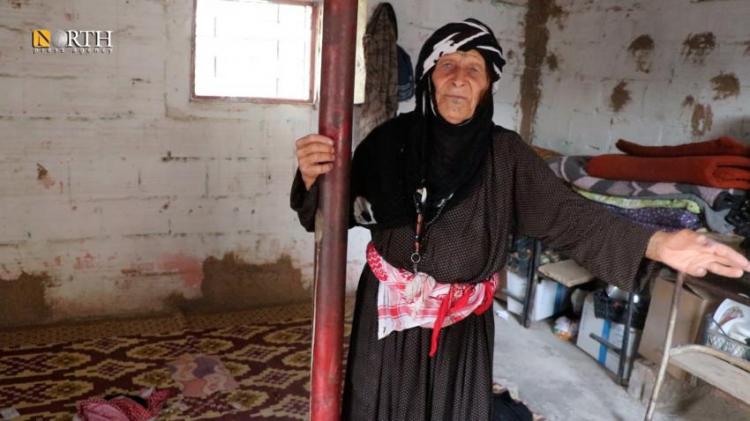Elderly people displaced by Turkish operations live in appalling conditions in northern Syria’s Tel Tamr
TEL TAMR, Syria (North Press) – Before Turkish forces and their affiliated armed groups attacked the city of Serekaniye (Ras al-Ain) in northern Syria at the end of last year, Wadha al-Ahmad lived with her husband in their mud house in the village of al-Souda, south of the city, surrounded by doting family members.
"The high temperatures and hunger are killing us…our situation is very difficult," she says of her suffering after she was displaced from her village due to the Turkish invasion.
Like hundreds of thousands of others displaced by the Turkish invasion in northeastern Syria, the 78-year-old woman lives with her 93-year-old husband Shaykh Muhammad in deteriorating conditions. The war separated their family of 11, and left them with no income for the elderly members.
"Life was beautiful in our village," the elderly woman says, recalling her life before the Turkish attack on the area. "We did not need anything."
The Turkish military operation on the Sere Kaniye region in northeastern Syria late last year caused the displacement of more than 300,000 people, according to United Nations figure
Escape from death
As soon as the war reached the outskirts of the village, the elderly, accompanied by the other villagers, went out towards the unknown, intending to flee from shells that were raining down on the village and its surroundings, even though fighters from the Syrian Democratic Forces (SDF), who Turkey was claiming to target in their operation, never entered the village.
After two nights spent sleeping in fields, they headed towards the town of Tel Tamr, and there the council of the town received all the displaced and housed them in schools until another shelter was secured for them. The elderly were sheltered in a room in a small school in the center of the town.
"They were black days, and death followed us," al-Ahmad adds tearfully.
She remembers with sorrow what happened to her house when Turkish-backed opposition militants entered it. "They stole everything , all the contents of my house: the fridge, the mattresses, and even the pillars that were supporting the roof of the house."
Hard life
After the family fled the village, which they could no longer return to due to the presence of the Turkish-backed armed group, the family members were dispersed. Some headed to the city of Hasakah and others to villages in the countryside. Only one of her sons, along with his family, lives in a classroom in the school next to his parents' room, but he is unable to help them.
The room lacks the most basic necessities. The ceiling of the room, which does not exceed 15 square meters, is covered with torn tents from the United Nations Children's Fund (UNICEF) supported by wooden beams. The holes in the walls are blocked with mud from the inside.
In the middle of the room is a worn mat surrounded by simple cooking utensils and mattresses. The room lacks a refrigerator and air conditioner, though temperatures sometimes exceed 48 degrees Celsius. The room next door contains water bottles which al-Ahmad says she picked up from the street.
"Our situation is very bad, as you can see…I live with my old husband in this room without the simplest necessities of life; we cannot do anything about it," she says solemnly.
Nobody helps
What hurts the 70-year-old woman more than the bitterness of displacement is her abandonment by her relatives since their displacement ten months ago. They have not visited or asked about their condition. Even her only son, who lives next to her, does not visit her often and is unable to help them due to unemployment.
"No one says 'this is my mother or my father, help them.' Here we are, fed by the alms of the neighbors," she laments.
Aisha, who is the niece of al-Ahmed's husband, Shaykh Muhammad, lives in the neighboring school. “Our condition is bad, we suffer from high temperatures. During the day it is unbearable in the room; we leave our room during the day and sit under trees," she says.
Regarding how her uncle and his wife secure their livelihood, Aisha adds: "My uncle has memory loss and is now begging in the town's streets, where people give him things to secure his needs."
Aisha pointed out that humanitarian organizations do not provide them with support and ignore their living conditions. “Previously, we used to receive aid, but now no one helps us. Our children sell dry bread so they can buy some of our needs.
Al-Ahmed concluded talking about her suffering as she wiped her tears: "If only life were without old age; death is more merciful than life that disembowels us with hunger in this room that grills our skin with heat."
Reporting by Delsoz Yousef

